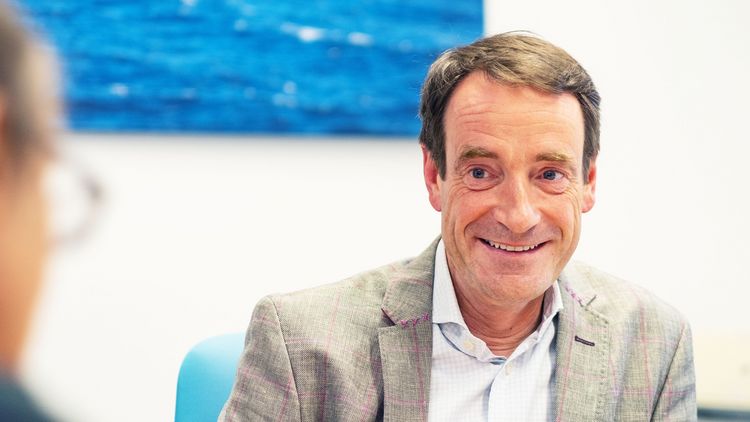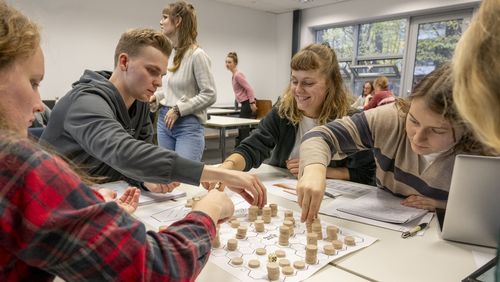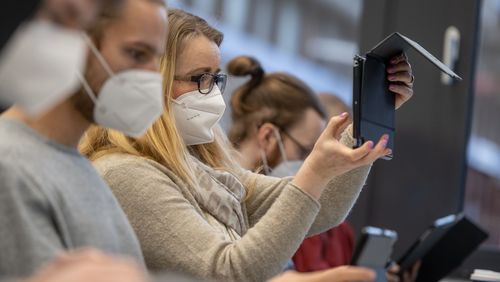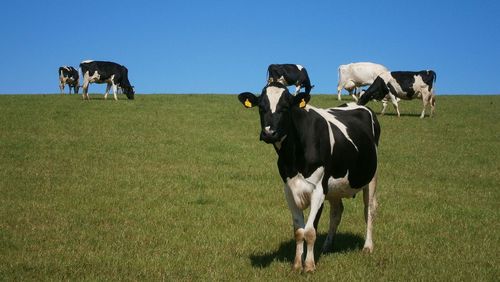Bernd Siebenhüner is committed to sustainable development – on many levels. As a professor of ecological economics he is concerned with “planetary boundaries” and the United Nations Sustainable Development Goals. His aim: to design a liveable, sustainable, socially just and ecologically sustainable future.
Mountains on one wall, the sea on the other: The pictures in Bernd Siebenhüner’s office alone illustrate that this researcher is impossible to pigeonhole. In his various roles as coordinator, manager or initiator, the Oldenburg professor of Ecological Economics is involved in a broad spectrum of sustainability projects: from collective learning processes and climate adaptation to international environmental policy; from organic agriculture in Africa and education for sustainable development to participatory processes for sustainability implementation.
The thread that holds together this colourful bouquet of research focus areas, says Siebenhüner, is transdisciplinarity. “My research is solution-oriented, it addresses socio-ecological problems and develops sustainable solutions in collaboration with stakeholders.” For Siebenhüner, this represents the greatest challenge as well as the greatest source of satisfaction: research that aims from the outset to be close to concrete developments in order to address global challenges.
Creative minds, flat hierarchies
Born in Delmenhorst near Oldenburg, Siebenhüner grew up in Berlin and studied political science and economics at the Freie Universität Berlin. He did his PhD at Martin Luther University Halle-Wittenberg before moving to Oldenburg in 2002 to take up the position of Junior Professor of Ecological Economics and head the junior research group “Social Learning and Sustainability”. As a young university with a special focus on interdisciplinarity and environmental research, Oldenburg had an excellent reputation, says Siebenhüner: "Lots of creative minds in management studies, a focus on environmental research, flat hierarchies, open doors. That really appealed to me. And it also allowed me to realize projects I could have never have dreamed of as a junior professor e.g. in Halle – for example, designing a new course in sustainability.” The Master’s programme in Sustainability Economics and Management was launched in 2006.
At the time, Siebenhüner was also working as a visiting researcher at the Potsdam Institute for Climate Impact Research (PIK). ”I was offered the chance to lead junior research groups at both institutions. And as is my wont when I can’t make up my mind, I accepted both offers.” From 2002 to 2005 he occupied the two positions in Potsdam and Oldenburg simultaneously. “It was an exciting time because the discussions on climate change in non-university research were different to those at the university.” Professor Hans Joachim Schellnhuber, one of the world’s leading climate researchers and director of the PIK for many years, sometimes dropped by Siebenhüner's office back then. “So, what questions are on the minds of Oldenburg researchers these days?” he wanted to know. Schellnhuber himself is an Oldenburg alumnus: it was here that he earned his habilitation, and he was a professor and director of the university's Institute for Chemistry and Biology of the Marine Environment (ICBM) in the early 1990s.
Exchange with students as motivation
In the end, the “Berlin boy” Siebenhüner opted for Oldenburg and a university career. “The intellectual exchange with other disciplines produces greater diversity in the sustainability discourse than you get at a non-university research institute which has a single thematic focus.” Another point in favour of the university: “I love the exchange with students because of their high level of motivation to get things moving and put them into practice,” the 52-year-old enthuses. It was the students, for example, who initiated the founding of the Oldenburg group of “Scientists for Future”. The objective of the group, which Siebenhüner helps coordinate, is to promote climate protection at the university and raise awareness of the climate crisis among the general population.
By the same token, Siebenhüner finds it most important to reach out to the students and “get them on board”. The university's Sustainability Report, which was published under his lead for the third time in 2021, is an excellent example of this. It was compiled by 20 students from various Master’s programmes. The results in a nutshell: the university’s direct greenhouse gas emissions were almost 70 percent lower than at the time of the previous report. “This is primarily a result of the university switching to clean power. It sends a strong signal to other large institutions in the region. Decisions like this can ultimately influence the market,” the political scientist and economist explains.
Economic activity within planetary boundaries
Sustainability is the issue underpinning all of Siebenhüner’s academic work and projects. He is driven by the conviction that society needs an economic system that will meet people’s needs, but is consistent with basic ecological principles. “Economy within planetary boundaries is the formula we use to describe a sustainable and ecologically-oriented economy,” Siebenhüner explains.
Whereas traditional economics argues that the purpose of economic activity is to satisfy people’s needs as best as possible and maximize utility, relegating other systems such as nature, climate and the environment to the role of mere contributors, ecological economics turns this thinking on its head: society is embedded within various ecological systems; economic activity is an instrument rather than the prime objective.
But while Siebenhüner is clearly committed to sustainable economic activity in his work, how sustainable is his own lifestyle? “That’s an important question,” says the scientist, and one, he adds, that anyone involved in the sustainability discourse should ask themselves. “Do we practise what we research and preach in our private lives?” Siebenhüner certainly tries to – and the city of Oldenburg provides a good starting point for keeping his ecological footprint as small as possible. The father of three doesn't own a car, for example. “Everything is so close by that I go everywhere by bike or on foot. I enjoy living here,“ he says.
Siebenhüner is convinced that the University of Oldenburg has long been a trailblazer in the quest for a sustainable society, but that it needs to keep working to develop this role and lead the way into the future. “We have to be pioneers, an engine for change at the local level in order to promote solutions for the city and the region.”
Concrete solutions for Oldenburg
The scientist is already pursuing concrete solutions for the city at the former military air base in Oldenburg. The interdisciplinary research project Energy-Efficient Neighbourhood Fliegerhorst Oldenburg (ENaQ) aims to create a climate-neutral neighbourhood by 2023 and serve as a model for smart cities. The project focuses on technology development and testing, digital solutions and people’s participation with the goal of facilitating the development of further smart city neighbourhoods.
Siebenhüner considers the principle of participation to be integral to the ENaQ project: “Amazing technological advances have already been made, but as long as people are not convinced of their benefits, these inventions will never be adopted and used.” For a functioning social system operating within planetary boundaries, you need both technological changes and behavioural changes, he says. “But the two must go hand in hand.” Which, in Siebenhüner’s view, makes it all the more important to put people at the centre of the project. This is the only way to create a carbon-neutral residential neighbourhood that meets the needs, wishes and interests of the participants, he explains. “It is an incredible opportunity to be involved in designing a neighbourhood like this.”
Africa: a strong partner
The ecological economist is not only searching for solutions locally – but on other continents as well. “Through the University of Oldenburg’s cooperation projects with South and East Africa, I have come to know and love the African continent. These projects have shown me just how much needs to be done to address the problems on the ground,” says Siebenhüner. However, he objects to the outdated approach to development cooperation that seeks to impose ideas from the Global North the Global South. “The thinking has changed. It’s all about working together now, because we’re all in the same boat when it comes to the UN Sustainable Development Goals. So we need to build cooperation with our African partners on equal footing,” explains the former vice president of the University of Oldenburg, who worked at Nelson Mandela University in Port Elizabeth, South Africa, from October 2014 to March 2015.
The University of Oldenburg – together with the University of Dar es Salaam in Tanzania – was a key partner in the project Ecosystem-Based Solutions for Resilient Urban Agriculture in Africa (ECOSOLA), which Siebenhüner coordinated. The researchers in the project were looking at how urbanization, housing, food security, access to bio-energy and infrastructure can be designed sustainably without overburdening the ecosystem. A rural community in the coastal region of Tanzania near the outskirts of Dar es Salaam was serving as a living laboratory. Siebenhüner’s research group “Ecological Economy” and the “Landscape Ecology” Group led by ecologist Professor Michael Kleyer worked closely with African colleagues for three years on the project, which ended in 2021.
UN Sustainable Development Goal: “Quality education for all”
Another project close to Siebenhüner’s heart is the Centre of Excellence for Educational Research Methodologies and Management (CERM-ESA) at Moi University in Western Kenya. Siebenhüner helped set it up in 2014 and it is now starting to bear fruit. The project is dedicated to modernizing the education system in East and Southern Africa. “Education has the potential to reinforce the United Nations Sustainable Development Goals. It enables us to really push forward ecological, social and economic objectives,” Siebenhüner explains. What he finds particularly convincing about this particular project is the way that five universities from Germany and Africa are working together to pave the way for a future-oriented culture of education. “And we all are learning from one another.”






